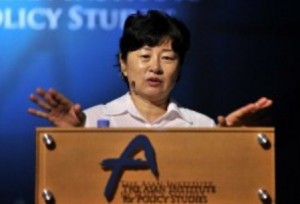
This photo taken on June 21, 2012 shows Kim Hye Sook, former North Korean defector, speaking on eyewitness testimony “Twenty-eight Years of My Life in Political Prison Camp (Gwalliso) Camp 18,” at a forum of the Asan Institute for Policy Studies in Seoul. Kim Hye-Sook survived a total 28 years of brutality, overwork and near-starvation in one of North Korea’s notorious prison camps. AFP FILE PHOTO
SEOUL, South Korea—Last month, a South Korean lawmaker told parliament that more should be done to help North Korean escapees adapt to life in the South, citing government data on suicides in the defector community.
A day later, another MP told the house that, on the contrary, more intensive scrutiny was needed, citing government data that half of all North Korean spies arrested in the past 10 years had been disguised as defectors.
Such a polarized mix of sympathy and suspicion is the experience of most North Koreans who manage to escape to the capitalist South, and for many it is both bewildering and upsetting.
For Lee Seok-Yong, 43, who arrived in 2007 with his wife and child, the overwhelming sense was one of being treated with mistrust and, at best, wary indifference.
“South Koreans tend to view defectors as trouble-making foreigners,” he told AFP.
In 2009, he was hired as a security guard at South Korea’s main international airport in the western port city of Incheon.
But he quit a year later as inter-Korean military tensions went into one of their regular upswings, and his co-workers began questioning the wisdom of having a defector working in a sensitive facility.
“In the end, I just couldn’t cope with the suspicion and the cynicism, especially after my boss asked why I didn’t just resign,” Lee said.
He eventually became a full-time activist, giving talks on the radio and in military camps about life under the North Korean regime.
Instead of dismissing defectors as a waste of tax-payers’ money, South Koreans should see them, Lee argues, as useful assets in preparing for the eventual reunification of the Korean peninsula.
But reunification is not the treasured dream it once was in South Korea, especially for a younger generation born outside the shadow of the Korean War who don’t view those north of the border as their lost brothers and sisters.
For all defectors, life in the South begins with intensive interrogation by the national intelligence service, which can last for months and is aimed at weeding out possible spies.
If they get through that test, they are given three months in a government centre where they learn basic survival skills, such as riding the subway, using a mobile phone and buying goods in a supermarket.
On leaving the centre they are eligible for a 7.0 million won ($6,500) lump sum as well as a 13 million won housing subsidy and numerous other benefits related to job training and work schemes.
But some quickly fall victim to groups—often comprising other defectors—who specialize in preying on new arrivals and cheat them out of their start-up cash.
“They are extremely vulnerable to fraud,” said Kim Yong-Hwa, who heads the North Korean Refugees Human Rights Association of Korea.
Although defectors nominally remain under state protection for their first five years in the South, Kim said more direct follow-up was needed to keep them safe.
In recent years, the government has deliberately staggered the lump sum payments to minimalize the chance of them losing everything at once.
Suicide risks
But surviving in a hyper-competitive society like South Korea is a huge challenge for people who suddenly find their educational and skills levels are way below the average.
Many end up in menial jobs where they complain of discrimination and a sense of being treated as second-class citizens in the country they risked their lives to escape to.
The unemployment rate within the defector community is 7.5 percent, roughly twice the national average.
A recent survey of 295 defectors, conducted by ruling Saenuri party lawmaker Kim Young-Woo, found that 55 percent had contemplated suicide sometimes or often.
Around 80 percent said they suffered from depression and the same number reported symptoms of anxiety and insomnia.
“Helping these people gain psychological stability is more important than financial assistance,” Kim said.
“They are emotionally very unstable, and require serious psychological care,” he added.
Since the end of the 1950 to 1953 Korean War, about 25,000 North Koreans have escaped and settled in the South.
South Korean government data shows there have been 26 suicides in the defector community.
The number reaching the South peaked at 2,929 in 2009 but dropped to half that last year as North Korean leader Kim Jong-Un tightened border controls after coming to power in late 2011.
Suspected ‘spies’
Lawmaker Sim Jae-Kwon sympathises with the challenges facing new arrivals, but argues that the screening process should be tightened up.
According to the Justice Ministry, South Korea has arrested 49 North Korean spies in the past 10 years, 21 of whom had posed as defectors.
“We have to guarantee the human rights and safety of defectors as much as possible, but the fact that nearly half of the spies were defectors shows the shortcomings of the National Intelligence Service’s investigations and the Unification Ministry’s management of refugees,” Sim told parliament.
“The government needs to take urgent countermeasures,” he added.
Kim Heung-Kwang, from a Seoul-based defectors group called North Korea Intellectuals Solidarity, said the spy cases had “amplified” suspicion of the refugee community.
“The discrimination isn’t always overt, but it’s rooted deep in the minds of ordinary South Koreans and even government officials,” Kim said.
He added that among those defectors with the opportunity to work or study abroad, a growing number were opting not to return.
“Some want a better education for their children, but others have simply had enough of the frustrations of life in the South,” Kim said.